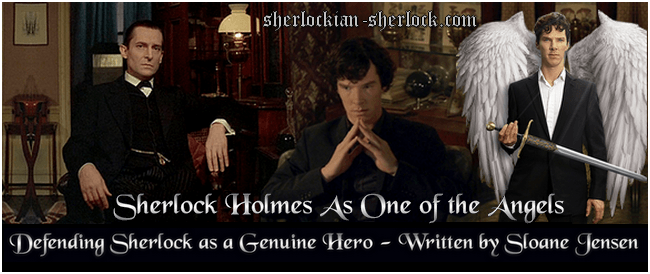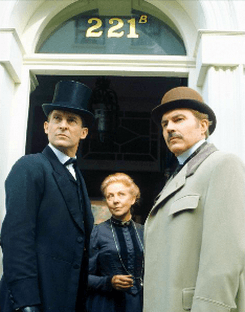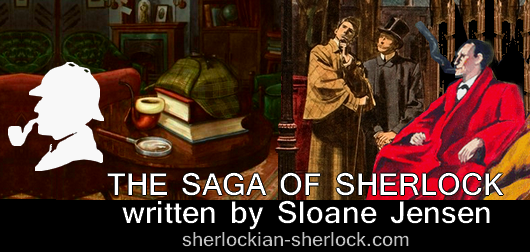
SHERLOCK HOLMES AS ONE OF THE ANGELS

Defending Sherlock as a Genuine Hero - Written by Sloane Jensen

''I think I may go as far as to say, Watson, that I have not lived wholly in vain...The air of London is the sweeter for my presence. In over a thousand cases I am not aware that I have ever used my powers upon the wrong side...Your memoirs will draw to an end, Watson, upon the day that I crown my career by the capture or extinction of the most dangerous and capable criminal in Europe [Professor Morarity].''
~ Sherlock Holmes to John Watson in 'The Final Problem'
In the BBC 'Sherlock' series starring Benedict Cumberbatch as Sherlock Holmes and set in modern-day London, Sherlock and his arch-nemesis, Jim Moriarty, have a final, intense conversation on top of the hospital of St. Bartholomew in the fateful 'The Reichenbach Fall' episode. Moriarty, who has trashed Sherlock's reputation and is now threatening Sherlock's only friends with execution if he does not willingly throw himself off the hospital roof, begins to lament how boring his existence is now that he has Sherlock beaten. Yet even though he seeks Sherlock's ultimate disgrace (death by apparent suicide), he still mocks the detective, saying: ''You're boring. You're on the side of the angels.'' To which Sherlock coldly replies: ''I may be on the side of the angels, but don't think for one second that I am one of them.'' For me, whose knowledge and love of Sherlock goes beyond this mostly excellent series and Cumberbatch's lovely cheekbones, it was a definite cringe-moment. One could argue here that Sherlock is simply telling Moriarty what he wants to hear, but when this statement comes after he has told his best friend John Watson very bluntly that ''Heroes don't exist and if they did I would not be one of them.'' I can't help but deduce that this is likely a true statement on Sherlock's part. Here Sherlock does not see himself as a hero nor he does not wish others to see him as such. He'd rather be thought of as a 'high-functioning sociopath,' hardly different than Moriarty himself.
I do not know why the creators of 'Sherlock' are so eager to stress the point that Sherlock is not really a hero (or that he does not want to be a hero), but I certainly object to it - mainly because it is a lie. Sherlock has always been a hero. He was a hero one-hundred and twenty-five years ago to the myriads of first-fans who read of his adventures in The Strand magazine and who rioted after Arthur Conan Doyle decided to kill him off in 'The Final Problem'. Sherlock made such a wonderful impression on people and inspired so much devotion to his character that he was resurrected by his own fan-base who refused to believe that he was dead and demanded that Doyle bring him back. If they had not loved him so much the body of the Great Detective would be laying forever with Moriarty's in its watery grave at the bottom of the Reichenbach Falls. Thanks to his fans, Sherlock lived on to solve more cases, defeat more villains and thwart attacks on England by foreign spies before (and after) finally retiring in (relative) peace on the Sussex Downs as a simple bee-keeper.
Sherlock is a hero. He saved countless lives, brought justice and consolation to hundreds of wronged men and women, averted scandals, protected his country, saved reputations and sent many a criminal to his just reward all with little or no regard for his own personal health and safety. He stopped many innocent people from being jailed or executed for crimes they did not commit, and brought to light the sins of the guilty who had avoided being jailed or executed for their crimes for so long. And he didn't do it all just because he was bored. He got bored, certainly, but he also cared about the people who came to him and had compassion for them on account of the strange or tragic situations they where in. It didn't matter to him what the social or financial status of his clients were, if they had a problem that intrigued him and required his unique skills, he took it. Maiden or king, government official or elderly landlady, Englishman, American or German, he helped them all. He did not seek his own glory, he let Scotland Yard take most of the credit for work he himself had done. He was even offered the knighthood, yet turned it down. He never intentionally used his skills for or against the 'wrong side.' Sherlock knew who's side he was on. There was never in any doubt in his mind. He served the 'God of justice' and took grim satisfaction in triumphing over an evil-doer. Yet he was also merciful and sound in judgment. Sometime he even let a criminal go free after learning the true motives (it is almost impossible to lie to Sherlock) behind their crime (such as killing a murderer to avenge the unsolved death of a loved one). He was familiar with the workings of the criminal mind and on the general fallen nature of humanity yet he himself never dabbled in the 'dark side' (as it were) or let himself slide into total depression or addiction because of failure or lack of interesting cases.
Sherlock was truly 'married' to his work. His level of dedication to his needy clients, his tireless pursuit of criminals and his desire to try his hand and mind in solving mysteries that every-one else had given up on is astounding. I would even argue that the thrill and the satisfaction that he gets in solving the unsolvable through his method of deductive reasoning is his greatest source of pleasure. This is why he is able to willingly and deliberately forgo sex, sleep, food and even a healthy body so he might perfect that great art that makes him such a treasure to all mankind. Compared to the 'eureka!' moment when enlightenment descends upon his mind all those other pleasures that are typical to the rest of humanity are too shallow and boring in hindsight. That Sherlock never uses his methods to aid the devious and the corrupt and is even willing to die so that the world might be freed from a villain such as Moriarty is an eternal testament to his moral character and his Godly mission in life. Work, mission and pleasure have been fused as one, and even after retirement Sherlock still can't resist getting involved in the problems of his neighbors and the international tribulations of his country.
'I believe in Sherlock Holmes' is a beautiful and fitting statement by modern fans that show that whatever the BBC Sherlock might often say, he is indeed seen as a hero. Modern fans pined for his return after his 'death' in 'The Reichenbach Fall' episode just as they did when they read 'The Final Problem' in The Strand more than a century ago. We can't seem to get enough of Sherlock. He is the man who never lived and so he can never die. Although his character is unique and aloof he is loved by conman-place people of all countries, careers and walks of life. The Canon-Sherlock is a man of compassion, grace and manners. He is a dignified Victorian gentleman with a subtle sense of humor who possesses a great heart as well as a great brain. He knows how to judge rightly, to distinguish between good and evil, and actively works for the betterment of society. When under the threat of termination by Moriarty and his vast criminal web he is not dismayed or cowed by the course his career has taken. He admits that danger is a part of his trade and the threat of a premature death has little effect on him, for he can rest easy with the knowledge that he has not squandered his talents or misused his gifts. Moriarty's desperate do-or-die attack on him at the Falls of Reichenbach is a good indicator on just how completely Sherlock bested him. Moriarty's criminal career was finished, all he could do was finish Sherlock's as well. But Providence declares that it is Moriarty's day to die (Yes, Canon-Sherlock does believe in God and thanks Him for his deliverance - though his fans also deserve equal thanks!). Yet even if the Professor had succeeded in taking the Detective permanently with him, Sherlock's honor or reputation would not have been ruined and his deeds would have been in no way lessened. All men, good or evil, are known by their works - all trees are known by their fruit; and the adventures of Sherlock and John Watson have born good fruit for over a century, both in the evolution of real-life crime-forensic research that have helped real-life victims and detectives and by providing every-day people like myself with a wonderful place to escape to when the trails of modern life become a bit too much. That Sherlock and John will always be there at 221B Baker Street in that 'fixed point in time' where it is 'always eighteen ninety-five' is a great comfort and hope to many, as this wonderful poem by Vincent Starrett so eloquently expresses:

|
221b
Here dwell together still two men of note
Who never lived and so can never die:
How very near they seem, yet how remote
That age before the world went all awry.
But still the game's afoot for those with ears
Attuned to catch the distant view-halloo:
England is England yet, for all our fears—
Only those things the heart believes are true.
A yellow fog swirls past the window-pane
As night descends upon this fabled street:
A lonely hansom splashes through the rain,
The ghostly gas lamps fail at twenty feet.
Here, though the world explode, these two survive,
And it is always eighteen ninety-five.
|
''The game is afoot, Watson!'' is a common Sherlock exclamation when a new case opens up or when things get heated. This statement can have a two-fold meaning: It can mean that Sherlock can now engage his over-active mind in a 'game' of deductive reasoning, in brain-battles and wit-wars, yet it can also mean that there is literal 'game' [as in prey that is to be hunted] about - a criminal or a prospective criminal that need to be tracked down and brought to justice. Sherlock may be lazy at home in between cases, but when 'game' is 'afoot' he and Watson spare no ounce of energy in doing their duties to help a client or their country, whether mentally or physically. Of course Sherlock will always be immaculately dressed and John will have his trusty revolver with him (just in case) and 221B will always be waiting for them when everything is finished. Sherlock will finally eat some food and John will relax with his paper s in his armchair by the fireplace, and soon there will be a new client and a new adventure and a new story.
I believe that Sherlock Holmes is a true and genuine hero. He is not an amoral back-stabber with ulterior motives like so many modern 'heroes' are today. He does not seek fame or riches (although he gets plenty of both). He is not devious or cruel, or as rude, arrogant and dismissive as he is portrayed by Mr. Cumberbatch in the 'Sherlock' series. While I enjoy the 'Sherlock' show greatly, I feel that the deeper, wiser, more noble nature and essence of Sherlock is often done a disservice. Maybe with time his character will continue to improve as the series slowly progresses. But I am digressing. Doyle's Sherlock is an active hero who deliberately goes out into the world and makes it a better and safer place. He touches the lives of innocent people for the better and hunts down and eliminates criminals and criminal-organizations. No-one forces him to do it - he does it all of his own free will. It is his passion, his life, his great dance. And Victorian London will always be his true habitat, just like John Watson will always be his true best friend. In the modern-day London setting Sherlock is just a clever man among other many other clever man who rely on modern technology to get through their lives. Sherlock's character is a lot more constrained and limited in the modern world and the exact nature of his relationship with John is constantly being called into question. But in Victorian England Sherlock is the genius of geniuses, a man who is doing, writing and discovering things in the realm of criminal-science and chemistry and deductive reasoning that astounds the old European world, and his unique friendship with John is taken for what it is: the elegant, platonic comradeship between two men that is not the continued butt of suggestive jokes and winky- winky speculations by others. Canon-Sherlock is a gentlemen-hero; a hero with poise and class who is available to anyone who has an interesting problem that needs solving. He is a God-believing English patriot who loves violins, roses, bees and smoking. There is so much that can be learned from Sherlock and I believe, that as long as there are people who can read, Sir Arthur Conan Doyle's consulting detective will be loved for as long as this world lasts - because he is a hero who has borne good fruit, a hero without hypocrisy who will do what it takes to see justice served and a case solved.
I believe that Sherlock Holmes is not just on the side of the angels, but that he himself IS one of the angels. He is an angel and a hero to us, his dearly devoted, obsessive fans - both then and now, and hopefully for forever. Thank you, Sir Arthur Conan Doyle.
Article by Sloane Jensen
Date: 01/01/2015



Sloane Jensen
Sloane Jensen is a 25 year-old Sherlock Holmes fan who lives in the USA in the State of Colorado. She enjoys reading, writing, hiking, biking, fishing, horseback riding and hanging about the house in pajamas and a bath robe when not at work. She is grateful for more serious, Canon-respecting Sherlock sites like this one and is pleased to be able to submit her writings to the 'Sherlock-Sherlockian' English-site. Her favorite Sherlock actors are Jeremy Brett, Benedict Cumberbatch and Basil Rathbone in that order. Her favorite Sherlock short-story is 'The Dying Detective'.
Recommended article: Sherlock Holmes in America


The Saga of Sherlock
Poem by Sloane Jensen

Recommended site:
Jeremy Brett
Sir Arthur Conan Doyle
Benedict Cumberbatch - BBC Sherlock series


Sherlock Holmes Hercule Poirot world best detective

|












